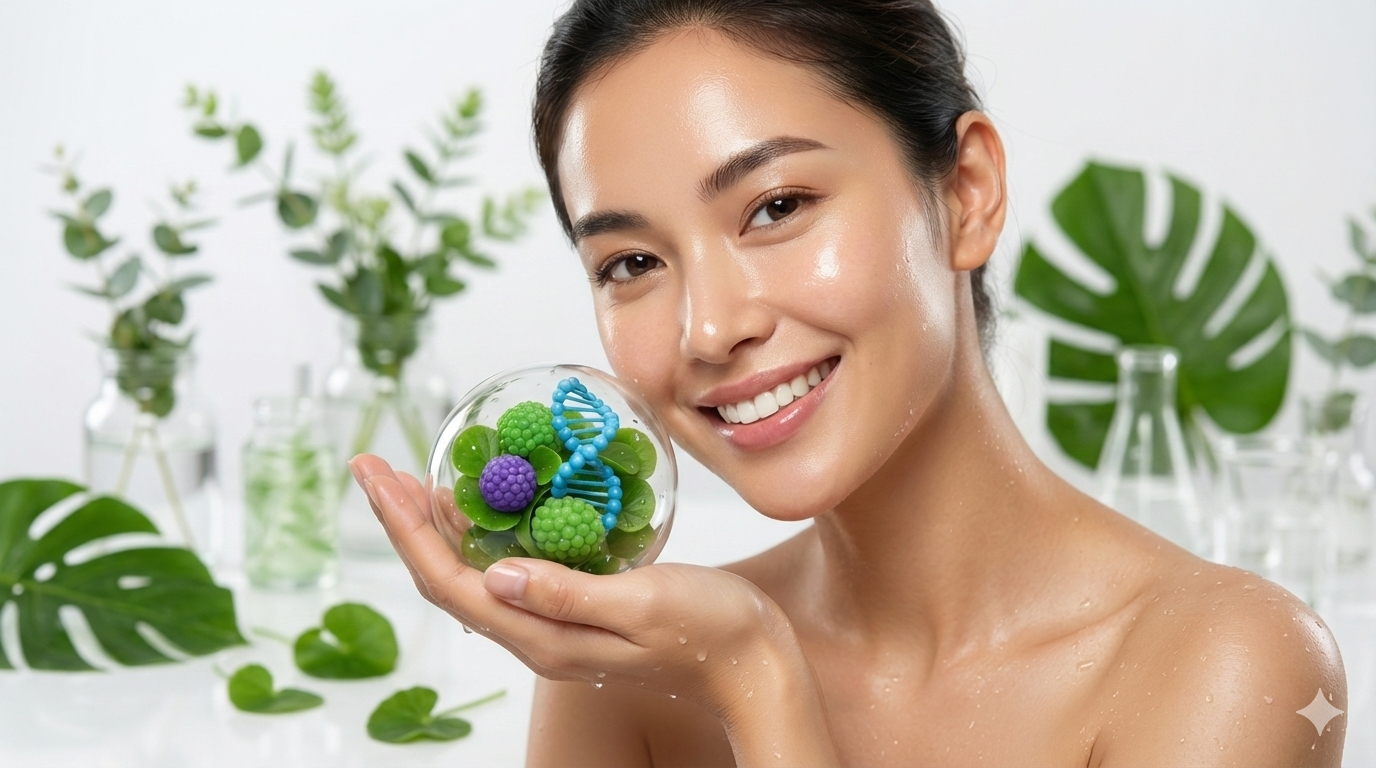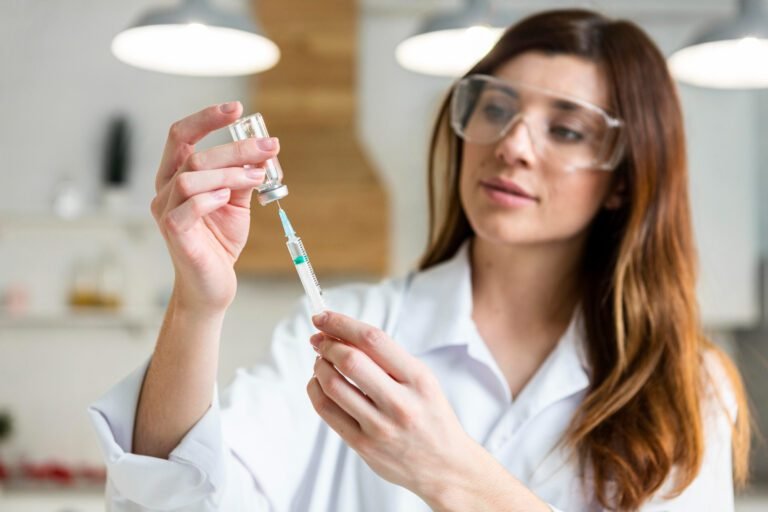The skincare industry is rapidly evolving. Consequently, scientific advancements mean active ingredients rightfully take center stage. Critically, these powerful compounds aren’t simply fleeting trends; instead, they offer targeted, research-backed solutions for a wide range of skin concerns. Therefore, let’s explore the most impactful ingredients shaping skincare this year, since clinical research backs each one.
1. Exosomes: The Future of Skin Regeneration
Exosomes are nano-sized extracellular vesicles that carry proteins, lipids, and RNA, thereby enabling intercellular communication. Because of this vital function, they play an essential role in regenerating skin cells. For this reason, their regenerative properties make them a groundbreaking addition to modern skincare formulations.
Benefits:
- Skin Repair: Exosomes promote cellular regeneration, effectively repairing damaged skin.
- Anti-Aging: Furthermore, boosting collagen production allows exosomes to significantly reduce fine lines and wrinkles.
- Hydration: Exosomes improve moisture retention by enhancing the skin’s barrier function.
Applications:
- Microneedling Enhancements: Professionals often combine exosomes with microneedling for enhanced skin rejuvenation.
- Topical Serums: Alternatively, manufacturers incorporate exosomes into serums that provide effective at-home treatments.
Considerations:
Although their clinical potential is promising, researchers still heavily study exosome-based products. Thus, further studies are necessary to validate their long-term efficacy and safety profiles. View the latest research here.
2. PDRN (Polydeoxyribonucleotide): DNA Repair at Its Best
Derived from salmon DNA, PDRN has earned a strong reputation for its wound-healing and anti-inflammatory properties. Moreover, it plays an essential role in promoting robust skin regeneration and recovery. Indeed, its benefits are vast.
Benefits:
- Cellular Repair: PDRN stimulates DNA repair mechanisms, vigorously encouraging skin regeneration at the cellular level.
- Anti-Inflammatory: Crucially, it helps reduce redness and irritation, making it ideal for sensitive skin.
- Hydration: PDRN improves moisture retention, leaving the skin feeling notably plump and hydrated.
Applications:
- Post-Procedure Care: Medical aesthetics commonly use PDRN for recovery after procedures like lasers or peels.
- Anti-Aging Treatments: Finally, manufacturers add it to creams and serums that target mature skin, effectively boosting cell turnover. Access supporting studies.
3. NAD (Nicotinamide Adenine Dinucleotide): Cellular Energy Boost
NAD is a coenzyme found in all living cells, playing a vital role in energy metabolism and DNA repair. Consequently, this powerful ingredient rejuvenates the skin by directly supporting cellular energy production. Clearly, its impact is significant.
Benefits:
- Anti-Aging: NAD enhances skin elasticity, thereby reducing the appearance of wrinkles and promoting a youthful look.
- Skin Repair: In addition, it accelerates the skin’s repair processes, helping to regenerate healthy skin cells.
- Radiance: NAD boosts overall skin tone and texture, which results in a brighter, more even complexion.
Applications:
- Serums and Creams: Companies incorporate NAD into products that target visible signs of aging, such as fine lines and loss of firmness.
- Supplements: Oral NAD supplements also support skin health from within, promoting systemic vitality and energy. See the data.
4. Niacinamide (Vitamin B3): The Multitasking Marvel
Niacinamide is widely known for its versatility in treating multiple skin concerns. As a result, it remains an essential ingredient in countless skincare formulations. Without a doubt, its popularity is justified.
Benefits:
- Brightening: Niacinamide reduces hyperpigmentation and dark spots, ultimately creating a more even skin tone.
- Anti-Inflammatory: Furthermore, it calms redness and irritation, making it a great option for sensitive skin.
- Oil Control: Niacinamide helps regulate sebum production, making it an excellent choice for oily or acne-prone skin.
- Barrier Repair: Significantly, it strengthens the skin’s natural defense, helping it retain moisture and resist environmental stress.
Applications:
- Serums and Moisturizers: Consumers commonly find Niacinamide in daily skincare products.
- Eye Creams: Targeted formulations also help reduce puffiness and dark circles under the eyes. Review clinical trials.
5. Tranexamic Acid: Targeted Treatment for Hyperpigmentation
Tranexamic acid, a synthetic derivative of lysine, is well-known for its potent depigmenting effects. Therefore, it’s rapidly gaining popularity for effectively addressing stubborn hyperpigmentation issues. In fact, it’s highly effective for melasma.
Benefits:
- Hyperpigmentation: Tranexamic acid helps reduce dark spots, melasma, and post-inflammatory pigmentation.
- Skin Tone: Moreover, it evens out skin tone, giving the complexion a radiant and youthful glow.
Applications:
- Serums and Creams: Tranexamic acid is a common ingredient in products designed to treat discoloration.
- Eye Contour Treatments: Likewise, formulators use it in treatments targeting dark circles and hyperpigmentation under the eyes. See supporting data.
6. Malachite: The Antioxidant Powerhouse
Malachite, a gemstone rich in antioxidants, is becoming increasingly popular in skincare for its formidable ability to protect against environmental stress. Indeed, this is a powerful ingredient. Ultimately, it shields the skin.
Benefits:
- Pollution Protection: Malachite shields the skin from oxidative stress caused by urban pollutants.
- Anti-Aging: In turn, it improves skin elasticity, reducing the appearance of fine lines.
- Calming: Malachite helps reduce inflammation, effectively soothing irritated skin.
Applications:
- Serums and Masks: Brands utilize Malachite in products directly targeting environmental damage.
- Cleansers: Additionally, manufacturers incorporate it into daily cleansers for detoxification and protection. View the research.
7. Spicules: Nature’s Microneedling Alternative
Spicules are tiny, needle-like structures derived from sea sponges. Importantly, they enhance exfoliation and ingredient absorption, providing a gentler, natural alternative to traditional microneedling. Specifically, they function as micro-darts.
Benefits:
- Exfoliation: Spicules gently remove dead skin cells, thereby promoting a smoother texture and more radiant skin.
- Ingredient Absorption: Crucially, they improve the penetration of subsequent active ingredients, significantly enhancing their effectiveness.
- Acne Treatment: Spicules help reduce acne lesions and scarring by mechanically exfoliating the skin.
Applications:
- Exfoliating Masks: We find them in products designed for deep skin renewal.
- Serums: For example, researchers find them in serums formulated to dramatically improve skin texture and clarity. Read the clinical data.
8. Ectoin: The Hydration Hero
Ectoin is a naturally occurring molecule produced by microorganisms to protect themselves against extreme environmental stress. Consequently, it has become a key ingredient in modern hydrating and protecting skincare products. This is because it draws moisture deep into the skin.
Benefits:
- Hydration: Ectoin helps maintain optimal skin moisture levels, thus preventing dryness and irritation.
- Protection: Furthermore, it shields the skin from damage caused by UV radiation and pollution.
- Anti-Inflammatory: Ectoin soothes irritated skin and reduces redness.
Applications:
- Moisturizers: Brands widely include Ectoin in products designed to deeply hydrate and protect the skin barrier.
- Sunscreens: Specifically, companies use it in sunscreens for added, synergistic protection against harmful environmental factors. Explore the science.
9. Adaptogens: Stress-Relief for Your Skin
Adaptogens are natural compounds that help the body manage stress and maintain balance. Therefore, these natural ingredients are increasingly useful in skincare to help mitigate stress-induced damage to the skin. Overall, they promote resilience.
Benefits:
- Stress Reduction: Adaptogens calm stressed skin, making them ideal for sensitive or irritated skin types.
- Anti-Aging: Moreover, they help reduce visible signs of aging often caused by stress and environmental exposure.
- Balancing: Adaptogens work to restore skin balance and resilience, improving overall skin health.
Applications:
- Serums and Creams: Formulators specifically use Adaptogens in products to soothe and restore stressed skin.
- Masks: Alternatively, they also appear in masks for deep relaxation and rejuvenation. See efficacy data.
10. Peptides: The Building Blocks of Skin
Peptides are short chains of amino acids, which are absolutely essential for the formation of proteins in the skin, such as collagen. Ultimately, these building blocks are vital in improving overall skin structure and function. In brief, they signal the skin to repair itself.
Benefits:
- Collagen Production: Peptides stimulate collagen synthesis, significantly improving skin elasticity.
- Repair: In addition, peptides promote the repair of damaged skin and support regeneration.
- Hydration: They effectively enhance moisture retention, thus preventing skin dryness.
Applications:
- Anti-Aging Products: Peptides are a staple in serums and creams targeting wrinkles and sagging skin.
- Post-Procedure Care: Finally, they assist in the crucial recovery process after treatments like microneedling. Read the latest findings.
Conclusion
The skincare industry is decisively embracing science-backed active ingredients that provide effective solutions for various skin concerns. Whether you choose cutting-edge compounds like exosomes, or proven mainstays like niacinamide and peptides, remember that these ingredients are clearly more than just trends—they are essential tools for achieving healthier, truly radiant skin. Therefore, choose your active ingredients wisely.





